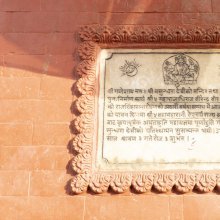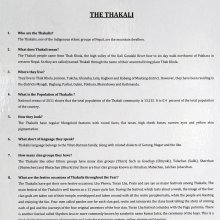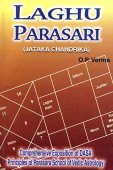Purnima, Purṇimā, Pūrṇimā: 18 definitions
Introduction:
Purnima means something in Hinduism, Sanskrit, Marathi, Hindi. If you want to know the exact meaning, history, etymology or English translation of this term then check out the descriptions on this page. Add your comment or reference to a book if you want to contribute to this summary article.
Images (photo gallery)
In Hinduism
Jyotisha (astronomy and astrology)
Source: Wisdom Library: JyotiṣaPurṇimā (पुर्णिमा) refers to “full-moon” day. The first lunar day (tithi) starts the day after amāvāsyā, or ‘new-moon day’. After fifteen tithis there is purṇimā (full-moon), after which the counting of tithis starts again for another fifteen days where it ends with amāvāsya again. The term is used throughout Jyotiṣa literature.
Source: archive.org: South Indian Festivities (astronomy)Purnima is the time of full-moon, or that period of time when the Moon is farthest from the Sun.
Source: Wikibooks (hi): Sanskrit Technical TermsPūrṇimā (पूर्णिमा).—Full Moon. Note: Pūrṇimā is a Sanskrit technical term used in ancient Indian sciences such as Astronomy, Mathematics and Geometry.

Jyotisha (ज्योतिष, jyotiṣa or jyotish) refers to ‘astronomy’ or “Vedic astrology” and represents the fifth of the six Vedangas (additional sciences to be studied along with the Vedas). Jyotisha concerns itself with the study and prediction of the movements of celestial bodies, in order to calculate the auspicious time for rituals and ceremonies.
Purana and Itihasa (epic history)
Source: archive.org: Shiva Purana - English TranslationPūrṇimā (पूर्णिमा) or Paurṇamāsa refers to the “full-moon night”, according to the Śivapurāṇa 2.2.15. Accordingly as Brahmā narrated to Nārada:—“[...] Firmly resolved in her desire to secure Śiva as her husband, she (viz., Devī as Satī) propitiated him in her own house with the permission of her mother. [...] She kept awake in the full-moon night [Paurnamasa] of Māgha (January-February) and worshipped Śiva on the banks of the river wearing wet clothes [...] After worshipping Him with the offerings of cloths and Bṛhatī flowers on the full-moon night [Pūrṇimā] of Jyeṣṭha (May-June) she spent the whole month observing fast”.
Source: Cologne Digital Sanskrit Dictionaries: The Purana Index1a) Pūrṇimā (पूर्णिमा).—A śakti on the ṣoḍaśa-patrābjā.*
- * Brahmāṇḍa-purāṇa IV. 32. 12.
1b) The meeting of the night at the Full Moon day; here both the Devas and Pitṛs see it;1 ety.2

The Purana (पुराण, purāṇas) refers to Sanskrit literature preserving ancient India’s vast cultural history, including historical legends, religious ceremonies, various arts and sciences. The eighteen mahapuranas total over 400,000 shlokas (metrical couplets) and date to at least several centuries BCE.
Vaishnavism (Vaishava dharma)
Source: Pure Bhakti: Arcana-dipika - 3rd EditionPūrṇimā (पूर्णिमा) or Amāvasyā refers to one of the various “lunar days” (tithi):—There are approximately 29.5 lunar days in a lunar month. The first fifteen days begin with the first phase of the waxing moon (pratipat) and end with the full moon (pūrṇimā). [...] In accordance with the lunar day, one would utter, [for example, pūrṇimā-tithau].

Vaishnava (वैष्णव, vaiṣṇava) or vaishnavism (vaiṣṇavism) represents a tradition of Hinduism worshipping Vishnu as the supreme Lord. Similar to the Shaktism and Shaivism traditions, Vaishnavism also developed as an individual movement, famous for its exposition of the dashavatara (‘ten avatars of Vishnu’).
Shaktism (Shakta philosophy)
Source: Google Books: ManthanabhairavatantramPūrṇimā (पूर्णिमा) refers to “she who is the full moon”, according to the Manthānabhairavatantra, a vast sprawling work that belongs to a corpus of Tantric texts concerned with the worship of the goddess Kubjikā.—Accordingly, “[...] Within the Sky-farer is the Mistress of the Sky-farer (Khageśvarī). She is the sky-faring of the Sky-farers. (She is) Kaulinī who, beyond the Void, is established in the Void. (The goddess continued): I (the goddess) am the (energy of Unstruck Sound called) the Female Gander of the Void (khahaṃsā), present in the Gander (of Unstruck Sound) and residing in the Void: I am the supreme energy in the world of transmigration. I am the Void and I have six parts. Completely full I am the Full Moon [i.e., pūrṇimā]. In the middle of the lunar orb, beyond destruction (kṣara), (I am) Kaulinī (the New Moon). [...]”.

Shakta (शाक्त, śākta) or Shaktism (śāktism) represents a tradition of Hinduism where the Goddess (Devi) is revered and worshipped. Shakta literature includes a range of scriptures, including various Agamas and Tantras, although its roots may be traced back to the Vedas.
General definition (in Hinduism)
Source: ACHC: Smarta PujaPūrṇimā (पूर्णिमा) refers to a religious rite (pūjā) or observance (vrata) occurring in the month Āṣāḍha (June-July).—Pūrṇimā = Vyāsa-pūjā = pūjā of teachers.
Languages of India and abroad
Marathi-English dictionary
Source: DDSA: The Molesworth Marathi and English Dictionarypūrṇimā (पूर्णिमा).—f (S) The day of full moon.
Marathi is an Indo-European language having over 70 million native speakers people in (predominantly) Maharashtra India. Marathi, like many other Indo-Aryan languages, evolved from early forms of Prakrit, which itself is a subset of Sanskrit, one of the most ancient languages of the world.
Sanskrit dictionary
Source: DDSA: The practical Sanskrit-English dictionaryPūrṇimā (पूर्णिमा).—The day of full moon; निखिलान्निशि पूर्णिमा तिथीनुपतस्थेऽतिथिरेकिका तिथिः (nikhilānniśi pūrṇimā tithīnupatasthe'tithirekikā tithiḥ) N.2.76.
See also (synonyms): pūrṇimāsī, pūrṇamā.
Source: Cologne Digital Sanskrit Dictionaries: Shabda-Sagara Sanskrit-English DictionaryPūrṇimā (पूर्णिमा).—f.
(-mā) Day of full moon. E. pūrṇa full, (the moon,) imak aff.
Source: Cologne Digital Sanskrit Dictionaries: Cappeller Sanskrit-English DictionaryPūrṇimā (पूर्णिमा).—[feminine] the day or night of full moon.
Source: Cologne Digital Sanskrit Dictionaries: Monier-Williams Sanskrit-English DictionaryPūrṇimā (पूर्णिमा):—[from pūra] f. the night or day of full moon, [Rājataraṅgiṇī; Sūryasiddhānta]
Source: Cologne Digital Sanskrit Dictionaries: Yates Sanskrit-English DictionaryPūrṇimā (पूर्णिमा):—(mā) 1. f. Day of full moon.
Source: DDSA: Paia-sadda-mahannavo; a comprehensive Prakrit Hindi dictionary (S)Pūrṇimā (पूर्णिमा) in the Sanskrit language is related to the Prakrit words: Ūṇimā, Puṇṇimā.
[Sanskrit to German]
Sanskrit, also spelled संस्कृतम् (saṃskṛtam), is an ancient language of India commonly seen as the grandmother of the Indo-European language family (even English!). Closely allied with Prakrit and Pali, Sanskrit is more exhaustive in both grammar and terms and has the most extensive collection of literature in the world, greatly surpassing its sister-languages Greek and Latin.
Hindi dictionary
Source: DDSA: A practical Hindi-English dictionaryPūrṇimā (पूर्णिमा):—(nf) the last day of the bright fortnight of a lunar month, the full-moon day.
...
See also (Relevant definitions)
Starts with: Purnimadina, Purnimagatika, Purnimajna, Purnimamanorathavrata, Purnimamtamasa, Purniman, Purnimanta, Purnimaratri, Purnimaratrisharvari, Purnimasi.
Ends with (+2): Ashokapurnima, Bhutapurnima, Calatpurnima, Chalatpurnima, Dandepurnima, Dandipurnima, Dyutapurnima, Guru Purnima, Gurupurnima, Janaipurnima, Karttikapurnima, Navannapurnima, Pautipurnima, Pavitripurnima, Potipurnima, Povatipurnima, Poyatipurnima, Rakhipurnima, Unendupurnima, Vaishakapurnima.
Full-text (+161): Purnama, Bhutapurnima, Guru Purnima, Purnimanta, Dyutapurnima, Purnimasi, Punava, Paurnami, Calatpurnima, Paurnima, Candrima, Amavasya, Ashokapurnima, Tithi, Purnimaratrisharvari, Purnimaratri, Purnimadina, Purnimamanorathavrata, Puno, Punnima.
Relevant text
Search found 42 books and stories containing Purnima, Purṇimā, Pūrṇimā, Poornima; (plurals include: Purnimas, Purṇimās, Pūrṇimās, Poornimas). You can also click to the full overview containing English textual excerpts. Below are direct links for the most relevant articles:
Cidgaganacandrika (study) (by S. Mahalakshmi)
Verse 21 [Moon the motif of creation and destruction] < [Chapter 1 - First Vimarśa]
Verse 22 [Nine Māṇas (measure of Time)] < [Chapter 1 - First Vimarśa]
Significance of the Moon in Ancient Civilizations (by Radhakrishnan. P)
5. Full Moon Festivals < [Chapter 10 - Analysis of the Data]
7. Sixteen Holi Kalas—Amrita Yoga Table < [Chapter 10 - Analysis of the Data]
Kashyapa Shilpa-shastra (study) (by K. Vidyuta)
4.2. Dikpariccheda or Dikparicchedana (fixing the cardinal directions) < [Chapter 1 - Introduction]
Chaitanya Bhagavata (by Bhumipati Dāsa)
Verse 2.5.10 < [Chapter 5 - Lord Nityānanda’s Vyāsa-pūjā Ceremony and His Darśana of the Lord’s Six-armed Form]
Verse 1.1.95 < [Chapter 1 - Summary of Lord Gaura’s Pastimes]
Verse 1.2.195 < [Chapter 2 - The Lord’s Appearance]
Dvisahasri of Tembesvami (Summary and Study) (by Upadhyay Mihirkumar Sudhirbhai)
Centres of the Avadhūta sect in India < [Introduction]
Related products



